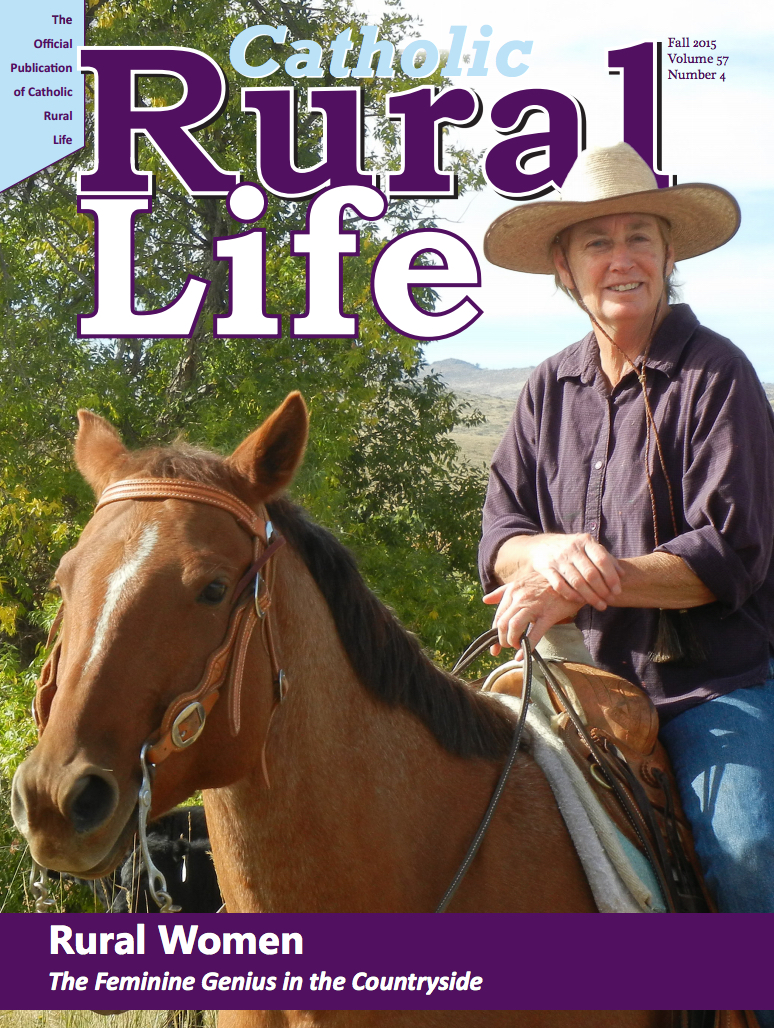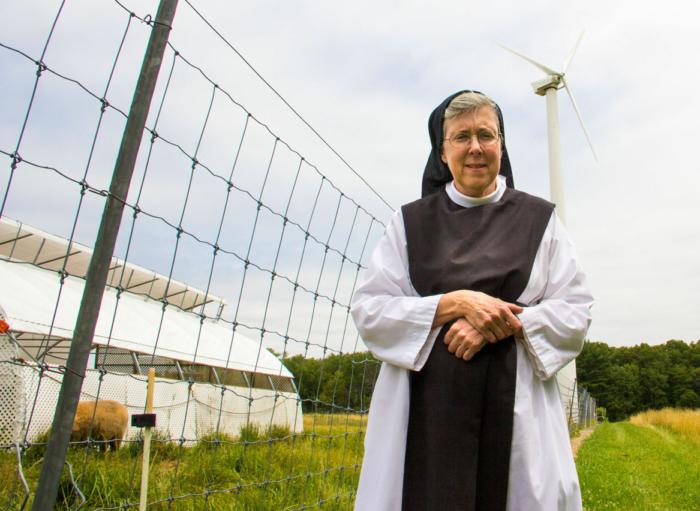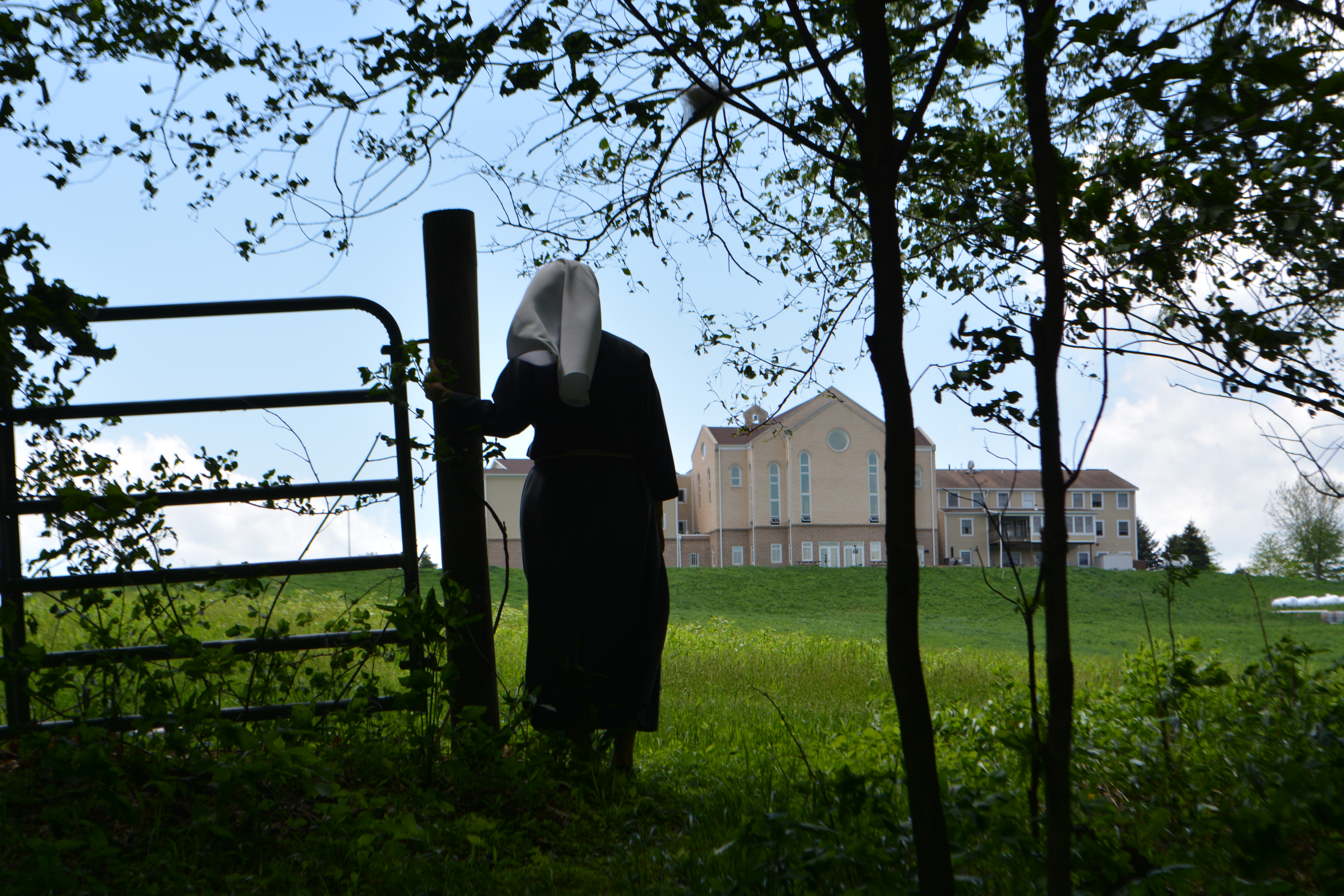 This article is from our Fall 2015 magazine, “Rural Women: The Feminine Genius in the Countryside.” To order your copy, visit our online store. To view this article as a PDF, click here.
This article is from our Fall 2015 magazine, “Rural Women: The Feminine Genius in the Countryside.” To order your copy, visit our online store. To view this article as a PDF, click here.
Throughout the history of the American countryside, communities of women religious have played a pivotal role in enriching the lives and souls of rural people. Whether by educating the children of immigrant farmers or by championing the application of Catholic theology to environmental concerns, religious sisters have led the way in service and ministry to rural America.
And women religious continue to live the faith in the countryside today, applying the teachings of Christ and His Church to the realities of rural communities in a multitude of ways. Some engage in apostolic work that connects directly with particular rural issues, such as strengthening ministry in small-town parishes or modeling sustainable methods of agriculture. Others share the faith in subtle, but powerful ways, by offering their prayers and presence.
Whatever the case may be, women religious in rural America are doing God’s work, and deserve our thanks and support, especially in this Year of Consecrated Life. Here is just a small selection of the many and diverse ways religious sisters continue to bring the faith to the countryside.
The New Evangelization in New Ulm

Rural communities face numerous challenges today. So many of these challenges are on the social and economic front that it’s easy to forget that people in the countryside need spiritual sustenance just as much as they need good jobs and intact families.
That’s what the Handmaids of the Heart of Jesus provide to Catholics in the Diocese of New Ulm, Minn., one of the country’s most rural dioceses (in fact, diocesan officials like to point out that it’s the only diocese in the country without a single mile of interstate). The young religious order, which has only been around since 2007, has a particular charism to carry out the New Evangelization in the diocesan life of the Church.
The Handmaids see themselves as a consecrated female compliment to the diocesan priest, a welcome counterpart in a rural setting where a single pastor is often spread out between several churches. “We definitely have a role in trying to support the priest and offer opportunities for catechesis in parishes,” said Sr. Regina Marie, the Handmaids’ current novice mistress.
The Handmaids’ apostolic work includes everything from teaching marriage prep courses to visiting the sick and the elderly. They also place a big emphasis on education and youth ministry
Sr. Regina Marie also points out that the rural context of New Ulm means that the Handmaids’ most effective evangelization efforts come through relationships and conversations, as opposed to big formal functions. She said that rural people are often “naturally attuned” to lives of simplicity and virtue—but sometimes a little nudge can be helpful to bring people toward a more “radical level of faith.”
“Our presence can actually help point them toward God, and help them to be grateful to God for all the blessings in their lives.”
Of course, the relationship works both ways. While the sisters feed the community with spiritual nourishment, laymen and women share the fruits of their farming with the Handmaids. In fact, the sisters are completely dependent upon the generosity of others, and do no grocery shopping of their own.
“It allows us to be in communion with them, and for us to show how grateful we are,” said Sr. Regina Marie. “It helps us show through our reliance on providence that everything is a gift from God.”
The Handmaids also rely on community support for the construction of their new chapel. You can find out when the next volunteer work weekend is by visiting handmaidsoftheheartofjesus.com.
Farming, Franciscan Style

Michaela Farm, which sits on the grounds of the Sisters of St. Francis in Oldenburg, Indiana, wasn’t always a conscious effort to model sustainable agriculture. Named after the community’s second reverend mother, the farm was originally established simply to feed the orphans that were taken in by the sisters.
But a lot has changed since 1854, when the farm first started functioning. After Michaela Farm was shutdown for about two decades, it reopened in the early 1990s with a new focus: explicitly applying the Franciscan emphasis of caring for creation to agriculture. “As Franciscans, we try to honor the land by what we do,” explained Sr. Peg Maher, who oversees the finances of Michaela Farm.
On the farm, which is worked by a mix of lay staff and religious volunteers, a concerted effort is made to merge agriculture, education and spirituality, embodying the “Franciscan spirit.” Only natural methods are used on the farm, which includes two acres of gardens, a herd of beef cattle, hundreds of egg-laying chickens, and several acres of pasture land and hayfields. This means there are no artificial fertilizers or weed killers, as the focus is on respectful use of resources and developing sustainable relationships with God’s creation.
The approach may make the work a little more involved, but Sr. Peg says it has its perks, and not just a clean conscience.
“We find that our eggs are so popular that our farm store is frequently sold out!” she shared.
Michaela Farm not only helps support the charism of the Sisters of St. Francis; it also gives them an opportunity to share the Franciscan method of creation-friendly agriculture with others. The farm typically takes on a couple of interns who are studying agriculture at a local community college, some who go on to run farms of their own using natural methods.
“I think we encourage people to see that food products and animals are not commodities, but are gifts that we’ve been given by God,” said Sr. Peg.
To learn more about Michaela Farm—including how you can volunteer and when the farm store is open—visit oldenburgfranciscans.org.
Cistercian Sustainability

The Trappistine Sisters of Mount St. Mary Abbey in Wrentham, Mass., have created quite a stir in recent years, as they’ve installed a field of solar panels, regulate building temperature with a geothermal system and recently erected a 100kW wind turbine on their property. While it’s true that some religious sisters have been known for their environmental activism, it’s a little less common to see habited, cloistered nuns prioritizing renewable energy.
But Sr. Mariann Garrity says the community’s decision to “go green” isn’t a progressive modification. Instead, it’s simply a contemporary application of the Trappistine tradition, a branch of the Order of Cistercians that has always prioritized sustainability throughout its near thousand-year history.
Sr. Mariann also emphasizes that, though monastics are “separate from the world,” they still need to be attuned to the crises facing mankind, such as environmental degradation.
“We want to be a witness to the values that should inform our times, and care for the environment is one of those values,” she said.
The Trappistines also promote care for creation through another powerful method: prayer. They have a second nocturne reading devoted to mediating upon Laudato Si, Pope Francis’ eco-encylical. Especially at lauds and vespers, the nuns pray for the needs of people throughout the world, including those negatively impacted by environmental crises. And of course, the psalms included in the Liturgy of the Hours constantly refer to God’s glorious creation.
“We say ‘all you winds, bless the Lord, all you seas bless the Lord,’ and it makes us realize that we need to witness to the Lord by harnessing the power of the wind and the power of the sun and the water,” said Sr. Mariann.
Sr. Mariann adds that addressing environmental concerns is not the ultimate goal of life; getting to heaven is. And she knows that environmental advocacy can go into dangerous territory if it’s disconnected from the Gospel. Which is why she says her community’s example of faith-based sustainability is a powerful and refreshing witness.
“Orthodoxy combined with concern for creation can be very potent if it’s pure.”
Learn more about the Trappistines and their commitment to sustainability at abbey.msmabbey.org.
Providence in the Desert

When the Sisters of Providence of Saint Mary-of-the-Wood, Indiana, met in 1996 to explore new opportunities for ministry, Sr. Carol Nolan knew where she wanted to go: Mexico.
“I just felt like we owe them so much and there was such a need,” she said.
However, the opportunity to establish something south of the border never materialized. But instead of Sr. Carol going to Mexico, Mexico, in many ways, came to her. She heard about a great need for ministry to Mexican immigrants in the Diocese of San Bernardino, California, and, after studying Spanish, established Providence in the Desert in 2002.
The primary ministry of Providence in the Desert, which operates in California’s Coachella Valley, is to teach English to immigrant farm workers. In addition to Sr. Carol, another religious sister and several lay volunteers teach as many as 100 students a year, holding classes in local schools and even making house calls to those who lack reliable transportation.
Sr. Carol says that Providence in the Desert continues the work of the Sisters of Providence, who taught the children of European immigrants for many years after the congregation’s founding in 1840. She also adds that learning English can give immigrant workers all sorts of opportunities, such as access to better paying jobs and good preparation for citizenship.
“These are our people, our brothers and sisters,” Sr. Carol said of those she teaches. “We’re helping them improve their lives.”
You can learn more about Providence in the Desert—and subscribe to the e-newsletter—by visiting spsmw.org/guerin-outreach-ministries/providence-in-the-desert.

Little Motherhouse on the Prairie
Okay, so the landscape outside of Toronto, Ohio, nourished by the Ohio River, can’t actually be described as prairie. But it certainly is rural and it’s also where the motherhouse of the Franciscan Sisters T.O.R. of Penance of the Sorrowful Mother is comfortably located.
And the countryside setting of the motherhouse is not accidental. The Franciscan Sisters are active, with vibrant ministries in urban Steubenville and on the campus of the nearby Franciscan University; but they’re also contemplative, and were looking for a place that was conducive to prayer and reflection when the young religious community (established in 1988) was building a new motherhouse.
“The motherhouse is something like a mini-seminary for younger sisters,” explained Sr. Mary Rose Bratilen. “So being out in the country is optimal; it’s quieter and away from the noise and traffic. We can hear the Lord better in our hearts.”
This gives the sisters the opportunity to encounter God readily in creation, through observing the changing of the seasons, walking the grounds, and maintaining a small garden.
But the Franciscan Sisters’ presence in rural Ohio also gives opportunities to local residents to be in relationship with the sisters, pray with them, and be inspired by their lives.
“It’s a nice reminder of God’s presence among us when they see the chapel and see the sisters,” said Sr. Mary Rose.
Sr. Mary Rose shared stories of simple evangelical encounters in the community: trips to the grocery store leading to prayer requests from strangers; local business owners becoming generous donors and lifelong volunteers; and area residents coming to the chapel for daily Mass or a seasonal banquet. These are just some examples of how the sisters have brought the faith to the countryside simply by their presence.
An even more profound impact has to do with religious vocations. Sr. Mary Rose says that a number of religious sisters in the community grew up in the area, and were inspired to pursue religious life by the example and presence of the Franciscan Sisters.
“They were raised in an environment where they were around us, and now they’ve joined us.”
To find out about upcoming events at the Franciscan motherhouse—including vocations retreats—visit franciscansisterstor.org.
The Order of (Ecological) Preachers

Dominicans are well known for their work in education and their emphasis on teaching the truths of the faith.
But when the Racine Dominicans in eastern Wisconsin found that they had fewer and fewer sisters teaching in schools, they decided to find other venues for carrying out their order’s charism.
This gave birth to the Eco-Justice Center. Established in 2004, the center sits on 15 acres of wood, pasture and gardens. It’s staffed by lay people, but three Dominican sisters live in-house and volunteer fulltime, including Sr. Janet Weyker, one of the original founders.
“It’s like home economics, but more related to how we take care of our common home,” Sr. Janet said of the educational offerings at the Eco-Justice Center. The center teaches conservation and sustainable energy use, and has programming for all ages, including organic gardening and cooking classes for adults and “hands on” summer camps for children.
Sr. Janet says educating kids about environmental stewardship is especially important.
“When you get to know nature, you’ll love it, and when you love nature, you’ll care for it,” she said, adding that people’s disconnection from nature has led to them abusing and exploiting it.
It might not be teaching high school theology courses, but Sr. Janet Weyker says the work of the Eco-Justice Center is consistent with the Dominican way.
“Education and justice have always been a part of our charism,” she said. “We are the Order of Preachers, and we preach through a lot of our teachings, and also our actions.”
Those “actions” Sr. Janet refers to are the ways in which the Dominicans strive to live out care for creation in their own lives. The center is certified “green,” and uses solar panels and a wind turbine to provide energy. The sisters also raise their own food, eating mostly vegetarian, keeping alpaca for fertilizer and fiber and chickens for eggs. Sr. Janet says this lifestyle helps remind others that living sustainably can actually be an act of worship.
“We revere and respect creation because God created it for us.”
Learn more about class offerings at the Eco-Justice Center by visiting racinedominicans.org.

















